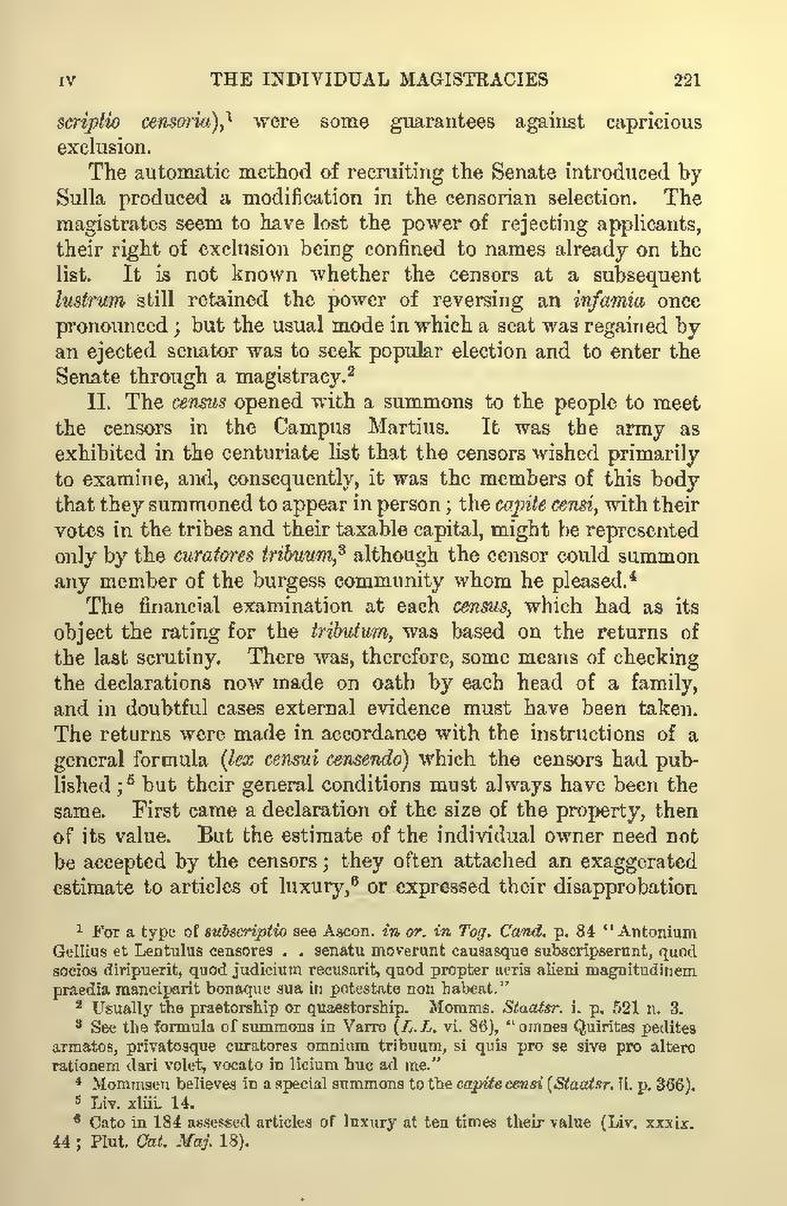- scriptio censoria),[1] were some guarantees against capricious
exclusion.
The automatic method of recruiting the Senate introduced by Sulla produced a modification in the censorian selection. The magistrates seem to have lost the power of rejecting applicants, their right of exclusion being confined to names already on the list. It is not known whether the censors at a subsequent lustrum still retained the power of reversing an infamia once pronounced; but the usual mode in which a seat was regained by an ejected senator was to seek popular election and to enter the Senate through a magistracy.[2]
II. The census opened with a summons to the people to meet the censors in the Campus Martius. It was the army as exhibited in the centuriate list that the censors wished primarily to examine, and, consequently, it was the members of this body that they summoned to appear in person; the capite censi, with their votes in the tribes and their taxable capital, might be represented only by the curatores tribuum,[3] although the censor could summon any member of the burgess community whom he pleased.[4]
The financial examination at each census, which had as its object the rating for the tributum, was based on the returns of the last scrutiny. There was, therefore, some means of checking the declarations now made on oath by each head of a family, and in doubtful cases external evidence must have been taken. The returns were made in accordance with the instructions of a general formula (lex censui censendo) which the censors had published;[5] but their general conditions must always have been the same. First came a declaration of the size of the property, then of its value. But the estimate of the individual owner need not be accepted by the censors; they often attached an exaggerated estimate to articles of luxury,[6] or expressed their disapprobation
- ↑ For a type of subscriptio see Ascon. in or. in Tog. Cand. p. 84 "Antonium Gellius et Lentulus censores . . . senatu moverunt causasque subscripserunt, quod socios diripuerit, quod judicium recusarit, quod propter aeris alieni magnitudinem praedia manciparit bonaque sua in potestate non habeat."
- ↑ Usually the praetorship or quaestorship. Momms. Staatsr. i. p. 521 n. 3.
- ↑ See the formula of summons in Varro (L.L. vi. 86), "omnes Quirites pedites armatos, privatosque curatores omnium tribuum, si quis pro se sive pro altero rationem dari volet, vocato in licium huc ad me."
- ↑ Mommsen believes in a special summons to the capite censi (Staatsr. ii. p. 366).
- ↑ Liv. xliii. 14.
- ↑ Cato in 184 assessed articles of luxury at ten times their value (Liv. xxxix. 44; Plut. Cat. Maj. 18).
